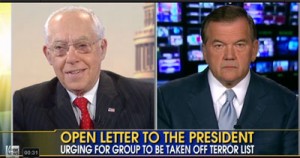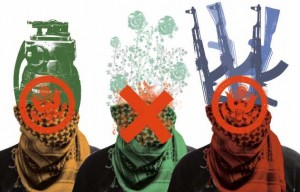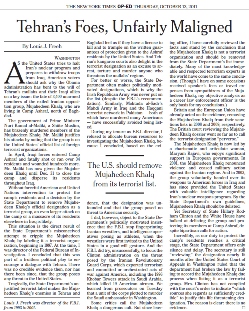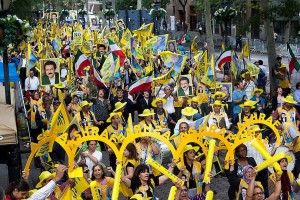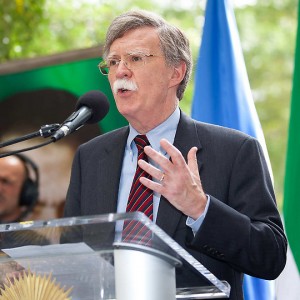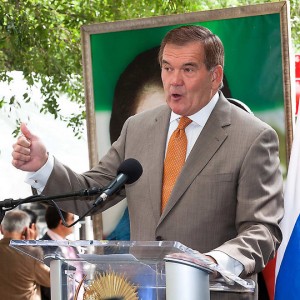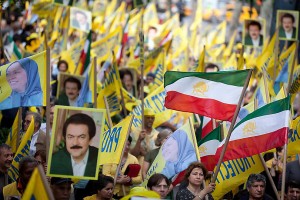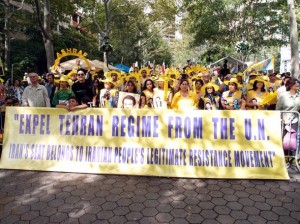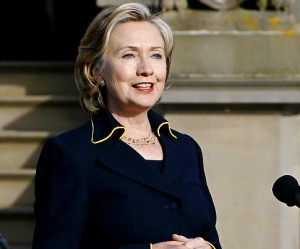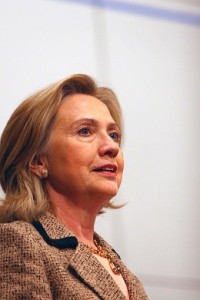FoxNews
Fox News: More than a dozen of countries top security officials wrote an open letter to President Obama last week in the New York Times about a group they say has been falsely designated as terrorist. Former Secretary of Homeland Security,TomRidge, and former Attorney General, Michael Mukasey, were two of the authors of the letter who have joined us now to explain this.
Gentlemen, this is an interesting group of leaders that came together to write a letter. They were Republican like yourself, along with Rudy Giuliani plus Democrats like Howard Dean and Governor Ed Rendel … What was so important that you all wanted to write to President Obama?
Mukasey: This group was designated as a terrorist group back in 1990s as a kind of strategic device trying to open dialogue with the Iranian regime, and obviously that has not worked.
They were kept on the list afterwards in the belief that if they were taken off the list the Iranian regime would get upset and would do things like support the terrorists inIraqand send IEDs intoIraq, and of course the regime is doing it anyway.
This group has been persecuted inIran. They have a group of 3400 of them who are living in acampIraqand are now in danger of being obliterated by the Iraqi Army.
Fox News: In fact we have seen some evidence that may already be happening. I just want to define for our viewers what this is? This is a group called MEK. They are committed to a secular, democratic and non-nuclearIran. They sound important toIran’s future.
Tom Ridge: They certainly are. This designation has lasted for almost 15 years with the naive hope that keeping them on the terrorist list would encourageIran to negotiate with theUS around many issues. But the real terrorist organization frankly is the State of Iran.
It is the world’s leading exponent and export of terrorism. The regime is responsible for a lot of de-stabilization and death not only in their own country but in theMiddle East.
Frankly, these 3400 man and women atcampAshrafhave been vetted by the FBI and Justice back in 2003 and 2004. They found no evidence of any terrorist connections whatsoever.
We promised them, theUSgovernment promised them, that we would protect them. Yet, in spite of our promise, in 2009 and 2011, Iraqi forces using equipments, vehicles, weapons, and unfortunately training from theUS, have invaded the camp, killed 36 people and wounded 300 others.
They have to be taken off this list. We have to get Blue Helmets from the UN to protect them. We have to live up to our promise. Our creditability is at stake here.
Fox News: Absolutely. That video that we were just watching, I believe, is from the day in 2009 from the clashes there with Iraqi forces.
What happened? Why we have not kept our promise to the 3400 women, children, and men who we believe in to keep them out of the harms way?
Mukasey: The Iraqi government is more and more adjusting its policies to please its neighborIran because our presence there is diminishing.
The Iranian regime obviously wants these people stamped up. As the result, the Iraqis have been cracking down on them, and we are not in a position to do anything about it.
Fox News: Have you got a response to your open letter to President Obama yet?
Secretary Ridge: We have not got a response and frankly what we hear from the State Department on a regular basis is that it continues to be under advisement.
We need to understand that the EU looked at the available evidence. TheUKassembled a group of jurists who said that the designation of this group as a terrorist organization is perverse.
Our DC Court of Appeal here in theUSsaid about 15 months ago that we see no evidence of any kind that these individuals should be listed as a terrorist organization.
Frankly, it has been a license to kill these people, because the designation is the rational that the Iraqi government uses to wind on the two assaults in the 2009 and 2011.
We are fearful that there will be an assault within the next couple of weeks, because the Iraqi government has already blocked the main road in, and is denying some of the UN official access to the camp.
We need to delist them. We need to get monitors there. We need to live up to our promise. We promised personally to the 3400 people that theUSwould protect them. It is naive and morally bankrupt for us to think that we can continue to negotiate with 3400 lives at stake.
Fox News:TomRidge and Michael Mukasey. Gentlemen, thank you so much for coming in and bringing this to all of our attention, and we hope you get a response to this soon.
